|
|
|
Sort Order |
|
|
|
Items / Page
|
|
|
|
|
|
|
| Srl | Item |
| 1 |
ID:
122009
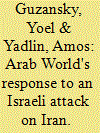

|
|
|
|
|
| Publication |
2013.
|
| Summary/Abstract |
In a television interview in November 2011, former head of Mossad Meir Dagan warned that an Israeli attack on Iran's nuclear facilities could lead to a regional war involving actors such as Hizbullah, Hamas and Syria. Israeli Prime Minister Benjamin Netanyahu has had a different view. In October 2012, he told French magazine Paris Match that such an attack would stabilise the Middle East:
Five minutes after, contrary to what the skeptics say, I think a feeling of relief would spread across the region … Iran is not popular in the Arab world, far from it, and some governments in the region, as well as their citizens, have understood that a nuclear-armed Iran would be dangerous for them, not just for Israel.
US officials, however, predict that Arab states would have a strong reaction to an independent Israeli attack. Such an assault is likely to sever Israel's already limited diplomatic relations with Arab states, they argue, and may destroy its peace treaties with Egypt and Jordan. Washington believes that an attack would give rise to popular protests in the Arab world, forcing its leaders to act.
|
|
|
|
|
|
|
|
|
|
|
|
|
|
|
|
| 2 |
ID:
131462
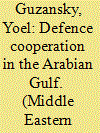

|
|
|
|
|
| Publication |
2014.
|
| Summary/Abstract |
The Arab Gulf states have systematically worked to tighten their cooperation in various fields. However, progress toward increased defence collaboration continues to be slow due to a number of factors including fears of angering neighbouring countries, particularly Iran; protecting state sovereignty; and reliance on other forms of defence, such as national militaries and foreign allies. This article traces the ups and downs of defence cooperation between the Arab Gulf nations, focusing on the establishment of the GCC and the joint Peninsula Shield Force, crucial milestones in Arab Gulf security coordination. A timeline of increased and decreased cooperation is presented, including during the two Gulf wars, along with the manner in which the joint force has been employed, its associated concerns, and the potential future for defence collaboration.
|
|
|
|
|
|
|
|
|
|
|
|
|
|
|
|
| 3 |
ID:
142158
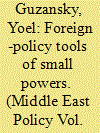

|
|
|
|
|
| Summary/Abstract |
This article analyzes the foreign-policy tools that Kuwait, Qatar, Bahrain, the United Arab Emirates (UAE) and Oman use in dealing with Iran. It argues that a policy of strategic hedging reduces the danger of conflict with Iran in the short term, while preserving contingency plans that address the severity of the threat and the uncertainty of the relationship in the long term. We could have expected that, because of their sense of threat, the small Gulf states would adopt a behavior of balancing Iran's power or, alternatively, of bandwagoning with it. However, these states have consciously chosen to adopt a “mixed” policy that includes elements of both methods. This stands in contrast to the assumption, widespread in the international-relations field, that they would choose to either balance1 or bandwagon as a way of coping with threats.
|
|
|
|
|
|
|
|
|
|
|
|
|
|
|
|
| 4 |
ID:
148065
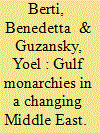

|
|
|
|
|
| Summary/Abstract |
More than three after the beginning of the Arab Awakening, it appears that the upheavals have, by and large, left the Gulf monarchies intact. While several dictators have fallen— from Ben Ali in Tunisia, Mubarak in Egypt and Gaddafi in Libya to Saleh in Yemen— monarchies across the region have shown considerable survival skills. But is this purported resilience likely to last even as the Arab Awakening continues to shake the Middle East and North African (MENA) region, or are the monarchs next in line now that the “presidents for life” have met their demise? This article explores the various ways in which Gulf monarchies have experienced political and social mobilizations associated with the Arab Awakening and then analyzes the characteristics that have allowed these countries to weather the storm, focusing on both pre-existing structural and cultural factors, as well as political responses to the unfolding regional protests.
|
|
|
|
|
|
|
|
|
|
|
|
|
|
|
|
| 5 |
ID:
118316
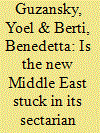

|
|
|
|
|
| Publication |
2013.
|
| Summary/Abstract |
This article focuses on the impact of the Arab Spring on pre-existing societal cleavages, specifically analyzing its impact on Sunni-Shiite relations. How have Sunni-Shiite relationships been reshaped by the ongoing social protests? Is there a rise in the inter-religious tensions among Sunni and Shiite communities across the region? And, if that is the case, what are the implications of this trend on both the region's potential for democratization, as well as on its overall stability and security?
|
|
|
|
|
|
|
|
|
|
|
|
|
|
|
|
| 6 |
ID:
137042
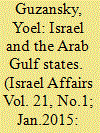

|
|
|
|
|
| Summary/Abstract |
The Gulf states have preferred to adhere to the basic Arab position vis-à-vis Israel, albeit supplementing such positions with their own, sometimes significant, adjustments. However the common threat from Iran has become a source of rapprochement between them and Israel, even if the establishment of ‘normal relations’ remains dependent on progress in the peace process between Israel and the Palestinians, Arab consensus and GCC politics. The two sides, each with their own logic, seem to prefer to maintain a dual policy that on the one hand accepts the lack of normalization but on the other hand maintains active, albeit tacit, ties.
|
|
|
|
|
|
|
|
|
|
|
|
|
|
|
|
| 7 |
ID:
156087
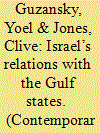

|
|
|
|
|
| Summary/Abstract |
By drawing on the literature about security regimes, this article posits the idea that a particular type of regime, which can be termed a “tacit security regime” (TSR), has begun to emerge between Israel, on the one hand, and several Gulf Arab states, on the other. It is a regime which, unlike liberal institutional variants that attempt to privilege the promotion of collective norms, remains configured around perceptions of threats to be countered and strategic interests to be realized. By examining the development, scope, and scale of this nascent TSR, this article explores the extent to which Israel, mindful of Washington, DC’s regional retrenchment, sees the emergence of such a regime as redefining the political and strategic contours of Israel’s relations with much of the Middle East.
|
|
|
|
|
|
|
|
|
|
|
|
|
|
|
|
| 8 |
ID:
135970
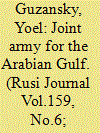

|
|
|
|
|
| Summary/Abstract |
Ongoing rivalries between members of the Gulf Cooperation Council make it an ineffective player in the region’s security When allies face serious external threats, their disagreements are often sidelined in order to promote a more visibly united front. Indeed, internal and external challenges recently prompted the six Arab monarchies of Saudi Arabia, the United Arab Emirates, Qatar, Kuwait, Oman and Bahrain to announce the formation of a joint military command. However, Yoel Guzansky argues that, as past experience indicates, this initiative might remain hostage to intra-Gulf Cooperation Council rivalries and make only a marginal contribution to Gulf security.
|
|
|
|
|
|
|
|
|
|
|
|
|
|
|
|
| 9 |
ID:
148179
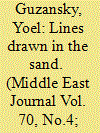

|
|
|
|
|
| Summary/Abstract |
Although the majority of territorial disputes between the Arab Gulf states have been settled on paper, the disputes and related issues have arisen periodically and negatively impacted the ability of the Gulf Cooperation Council to function successfully. States often raise boundary issues in order to achieve political goals, while at other times such disputes are placed aside or pushed toward resolution in the face of external threats and common interests.
|
|
|
|
|
|
|
|
|
|
|
|
|
|
|
|
| 10 |
ID:
140541
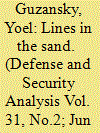

|
|
|
|
|
| Summary/Abstract |
This article explores series of “red lines” issued over the years by the USA and Israel toward Iran and Syria. It argues that the effectiveness of inflexible “red lines” in an environment that is given to rapid change is doubtful. They provide an adversary with the ability to determine when the deterring party will act and when they will not, a situation that is often undesirable. Moreover, their inflexible nature on the one hand opens the doors for circumvention while technically staying within their parameters. On the other hand, a strategy of more ambiguous “red lines” that allow flexibility in choosing the time, intensity, and nature of the response could also achieve a considerable deterrent effect, provided that they do not remain mere bluffs.
|
|
|
|
|
|
|
|
|
|
|
|
|
|
|
|
| 11 |
ID:
139501
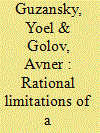

|
|
|
|
|
| Summary/Abstract |
The question of how to measure a state's rationality and compatibility with deterrence must be confronted in order to address the broader theoretical discussion concerning the credibility and effectiveness of deterrence. This article broadens Janice Stein's three-condition model of potential constraints of deterrence as a theory and a strategy. It then applies this revised model as a means of identifying potential obstacles to a future nonconventional deterrence regime with Iran, concluding with an assessment as to whether this analysis can support the argument that such a future deterrence regime would be stable.
|
|
|
|
|
|
|
|
|
|
|
|
|
|
|
|
| 12 |
ID:
143013
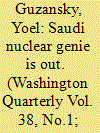

|
|
|
|
|
| Summary/Abstract |
A nuclear deal with Iran—Saudi Arabia's regional rival—was always going to be unwelcome news in Riyadh, as it means that Tehran receives international recognition as a nuclear threshold state. Saudi Arabia views a deal as an increase in Iran's power at Saudi expense. Even before any broad outlines for an agreement were in place, though, the negotiations themselves placed Iran on par with the world's leading superpowers. Which is exactly why Saudi Arabia made contingency plans to keep pace with Iran. In recent years, Riyadh has accelerated its own civilian nuclear development in response—a move that might undermine U.S. nonproliferation endeavors—but will make sure the Kingdom can match any nuclear capabilities Iran is allowed to maintain as part of any final nuclear deal with world powers.
|
|
|
|
|
|
|
|
|
|
|
|
|
|
|
|
|
|
|
|
|